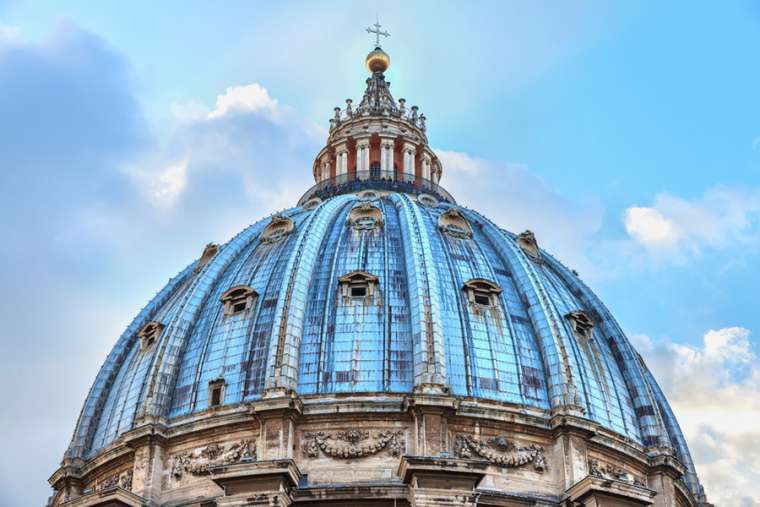The dome of St. Peter’s Basilica. / Credit: Luxerendering/Shutterstock.
A new letter from the Vatican Secretariat of State has banned the private celebration of Masses at side altars in St. Peter’s Basilica, effective 22 March.
The regulation might seem tailored to meet COVID restrictions, as Italy prepares to tighten its pandemic measures once again. However, the new rule appears to be permanent.
The letter stresses that Lent is a time to focus on the Word of God and celebration of the Eucharist. It says the changes are intended to ensure “the Holy Masses in St. Peter’s Basilica take place in a climate of recollection and liturgical decency.”
Until now, the 45 altars and 11 chapels in St. Peter’s Basilica have been used every morning by priests to celebrate their daily Mass. Many of them are Vatican officials who begin their day with the celebration.
Not all of the Masses are crowded – in some cases, in fact, the priest celebrates Mass alone, with no faithful participating.
The individual Masses were in addition to the general daily Mass schedule in St. Peter’s Basilica. According to that schedule, there is one Mass per hour from 9 a.m. to noon, in Italian, at the Altar of the Chair. There is another Mass in Italian at 8.30 a.m. at the altar of the Most Holy Sacrament, while every day at 5 p.m., there is a Mass in Latin.
On Sundays, there are five Masses celebrated in Italian and one in Latin.
Under the new measures, all priests will be able to participate in a pre-listed series of concelebrations: at 7 a.m. and 8 a.m. in the Chapel of the Choir; and at 7.30 a.m. and 9 a.m. at the Altar of the Chair. All the other Masses stay scheduled as they have been until now, although the Mass schedule on Sunday might change. On the feast day of a saint whose relics are in the Basilica, one of the Masses can be celebrated at the altar dedicated to that saint.
The measures also ask that the Masses have lectors and cantors.
Another change – Mass offered in the extraordinary form of the Roman Rite will be limited to the Clementine Chapel in the Vatican Grotto.
There has been a broad discussion of whether to end the practice of individual Masses, as part of a general reform of the management of St. Peter’s Basilica. However, decisions were postponed until the appointment of the new Archpriest of the Basilica, following the retirement of Cardinal Angelo Comastri, who had previously served in the role but had surpassed the normal retirement age of 75.
On 20 February, Pope Francis appointed as the new archpriest Cardinal Mauro Gambetti.
However, the letter from the Secretariat of State is not addressed to Gambetti, but to Archbishop Mario Giordana, extraordinary commissioner of the Fabric of St. Peter. This is unusual, since the Fabric of St. Peter does not deal with liturgical celebrations in the Basilica, but is instead charged with its conservation and maintenance.
The fact that the letter was released by the First Section of the Secretariat of State has also garnered attention, as the first section is a sort of Ministry of Internal Affairs, in charge of all the Curia offices’ direction and coordination, but typically not liturgical celebrations.
Additionally, the release of the letter was not accompanied by any kind of official Vatican communication. Nor was the letter signed in full by Archbishop Edgar Pena Parra, who heads the First Section of the Secretariat of State, but instead included only his initials.
These anomalies have prompted some speculation that the letter may have been forged. However, two Vatican officials who asked for anonymity confirmed to CNA that the document is real.
Source: CNA

